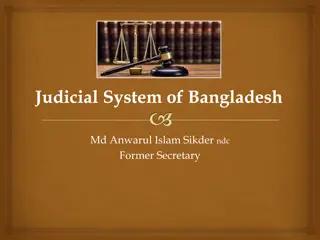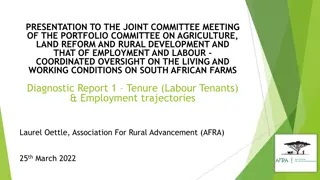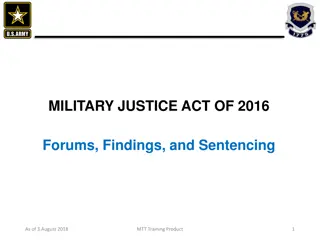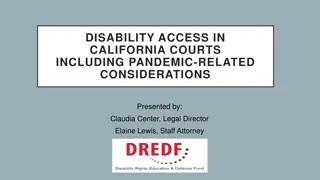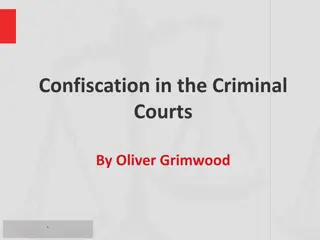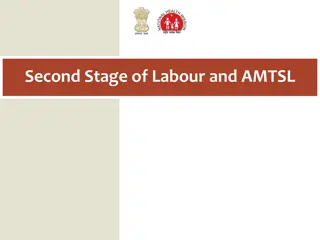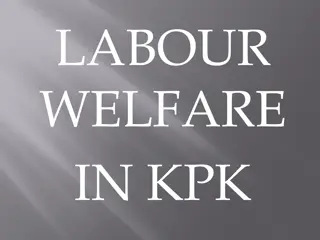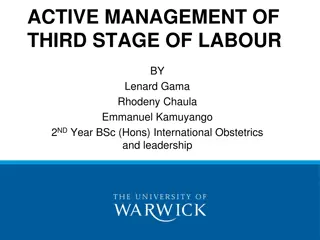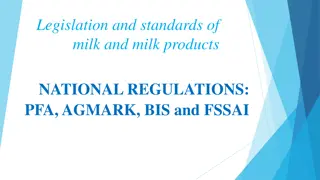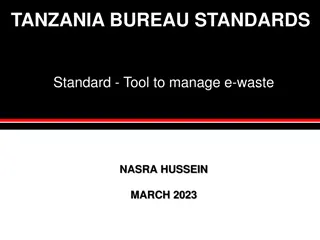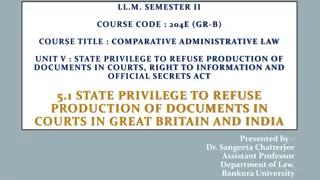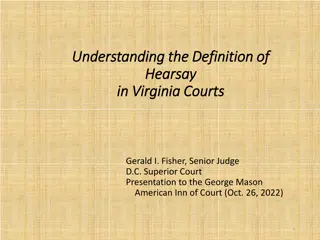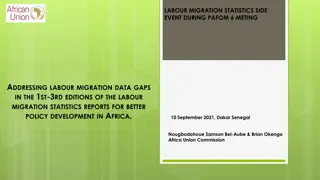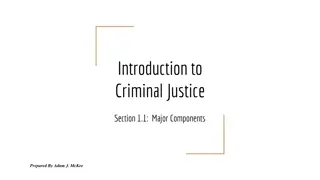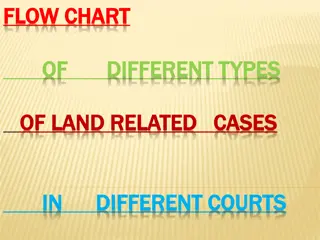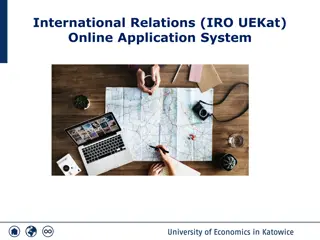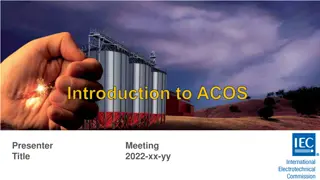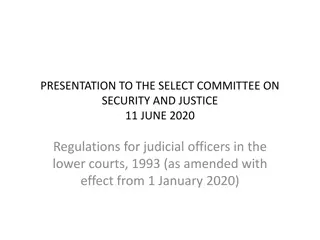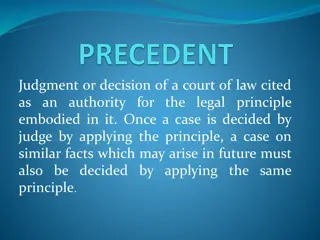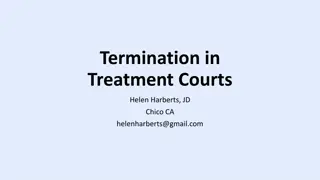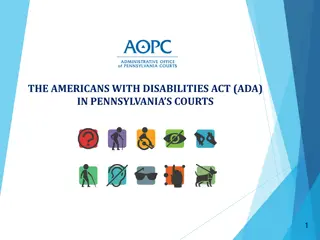International Labour Standards: Overview and Application by Courts
This document explores the adoption and implementation of international labour standards by the International Labour Organization (ILO), focusing on their use by domestic courts. It covers the basic features, composition, and significance of ILO conventions and recommendations, emphasizing their tripartite adoption and supervision. The ILO's role as a standard-setting organization and its development of quasi-case law through supervisory bodies are also discussed.
Download Presentation

Please find below an Image/Link to download the presentation.
The content on the website is provided AS IS for your information and personal use only. It may not be sold, licensed, or shared on other websites without obtaining consent from the author. Download presentation by click this link. If you encounter any issues during the download, it is possible that the publisher has removed the file from their server.
E N D
Presentation Transcript
Introduction to International Labour Standards and their Use by the Courts Alain Pelc Senior International Labour Standards and Labour Law Specialist ILO Bangkok DWT
Outline 1. Adoption of international labour standards and ILO standards policy 2. Supervision of the application of ILO standards 3. Possible uses of ILO standards by domestic courts.
The ILO and International Labour Standards A tripartite organization, in which employers and workers representatives participate in virtually all decision making, on an equal footing with governments A standard-setting organization, whose main means of action are the adoption of international labour standards, the supervision of their application and the provision of related technical assistance
International Labour Standards: Basic Features Conventions and Recommendations = instruments whose adoption is governed by article 19 of the ILO Constitution Tripartite adoption Universality / flexibility / normative content Extensive quasi case law developed by the ILO supervisory bodies on their application
International Labour Standards: Basic Features Conventions (and Protocols) - International treaties, legally binding when ratified - Ratified by Member States - Application is supervised by ILO expert and tripartite bodies Recommendations - Policy instruments, not legally binding - Not subject to ratification - Intended to inspire and guide Member States national policies
International Labour Standards: Composition To date: 190 Conventions (78 up-to-date) and 6 Protocols 206 Recommendations (86 up-to-date) Classified by: Subject matter Order of importance - 8 (now 10) Fundamental Conventions - 4 Governance Conventions
International Labour Standards: Composition 250 205 200 189 150 130 106 100 67 50 6 0 1919 1922 1925 1928 1931 1934 1937 1940 1943 1946 1949 1952 1955 1958 1961 1964 1967 1970 1973 1976 1979 1982 1985 1988 1991 1994 1997 2000 2003 2006 2009 2012 2015 Conventions Recommendations Protocols ILC Sessions
Ensuring that standards are relevant: Review of existing standards Examination of instruments adopted before 1985 by the working party on revision of standards (1995-2002) Conventions 70 up-to-date 24 to be revised 54 out-of-date Examination of Recommendations 55 up-to-date 13 to be revised 41 outdated
Ensuring that standards are relevant: Review of existing standards Task taken up since 2015 by the GB working group on the Standards Review Mechanism: To review 231 instruments organized in 20 thematic sets arranged by strategic objective 7thmeeting to take place in September 2022
Adopting new standards: Selection of Item 1. Problem identified 2.Elaboration of proposal In light of strategic objectives In light of existing standards 3.Preliminary Review (November) 4.Selection of items (March) Agenda for ILC two years later adopted Governing Body Governing Body Governing Body Office Request to the Office Proposal of the Office Short-listed items
Adopting new standards: Elaboration and adoption (double discussion) Submission to competent authority (within 12 months) Govt., Emp., Wrkrs Answers Comments Adoption of instrument(s) by a 2/3rd majority Int l Labour Conf. Discussion and Conclusions adopted Law and practice report with questionnaire Report for a first discussion Report of the first discussion Draft instrument(s) with comments Office
Submission of ILO instruments to competent authorities A constitutional obligation for all Member States (article 19) Aims at obtaining a rapid, yet informed, decision on the effect to be given to newly adopted instruments Must take place within 12 to 18 months (reminder sent by the Office after 12 months) Information to be sent to the Office
Ratification of ILO Conventions A sovereign decision Subject to the consent of competent authorities in accordance with domestic constitutional law Formal instrument of ratification to be communicated to the Director- General of the ILO Compulsory declaration to be included for certain Conventions Optional declarations as to the use of exclusions, exceptions or modifications permitted by certain Conventions Entry into force: one year after ratification is registered
Interpretation of ILO Conventions Primarily the responsibility of the ratifying State Application of the general rules of interpretation of the Vienna Convention on the Law of Treaties, 1969, including reference to connected instruments as part of the context and subsequent practice in the application Article 37(1) of the ILO Constitution: question or dispute to be referred for decision to the International Court of Justice Article 37(2) allowing the establishment of a tribunal to settle disputes
Supervision of the Application of International Labour Standards The ILO monitors the application of its standards One of the most advanced international supervisory mechanisms Consists of regular supervision and special procedures Involves expert and tripartite bodies Allows the full participation of employers and workers organizations Convention No. 144 requires consultation by the government of employers and workers organizations
Supervision: Regular Supervision Annual report on ratified Conventions Each of the Members agrees to make an annual report to the International Labour Office on the measures which it has taken to give effect to the provisions of the Conventions to which it is a party. These reports shall be made in such form and shall contain such particulars as the Governing Body may request. Article 22 of the Constitution of the ILO
Supervision: Regular Supervision
Supervision: Regular Supervision Committee of Experts on the Application of Conventions and Recommendations (CEACR) Independent, legal, expert assessment of the application of all ratified Conventions Committee on the Application of Standards of the International Labour Conference (CAS) Tripartite, political discussion of selected cases of application of ratified Conventions
Supervision: Regular Supervision Constitutional obligation of the Government to communicate copies of information and reports sent to the ILO to the most representative organizations (article 23, paragraph 2, of the ILO Constitution) Allows these organizations to transmit their own views, to the Government and/or to the ILO
Supervision: Regular Supervision When organizations make comments on the application of ratified Conventions, these comments are Transmitted to the Government, which is asked to provide its own views Submitted to the CEACR Mentioned in the report and often reflected in the comments of the CEACR
Beyond Supervision: Reporting on Non-ratified Conventions and Recommendations Constitutional obligation to report on the effect given to instruments selected by the Governing Body Basis for the General Surveys (a review by the CEACR of the effect given to instruments by both ratifying and non ratifying countries, and obstacles to their ratification or application) Subject matters aligned with the recurrent discussions under the 2008 Declaration on Social Justice for a Fair Globalization Basis also for reporting under the Follow-up to the 1998 Declaration on non-ratified fundamental Conventions
Supervision: Special Procedures Representations by employers or workers organizations (art. 24-25) Can be made by any organization of workers or employers, even without direct interest in the issue No requirement of prior exhaustion of domestic remedies Minimal formal requirements If receivable, examined by a tripartite committee set up by the Governing Body Conclusions and recommendations adopted by the Governing Body, can be published Often, follow-up by the Committee of Experts
Supervision: Special Procedures Complaints by member States or delegates to the ILC (art. 26 to 34) Lodged by a member State bound by the same Convention, or a delegate to the Conference Governing Body may set up a Commission of Inquiry of 3 independent members Recommendations must either be fulfilled or challenged before the International Court of Justice Failure to comply may lead to action under article 33 of the ILO Constitution
Supervision: Special Procedures Complaints to the Committee on Freedom of Association Not a constitutional procedure Can be lodged even in the absence of ratification of the relevant Conventions By an employers or workers organization demonstrating a direct interest in the matter No requirement of prior exhaustion of domestic remedies Examined by the CFA, a tripartite 9-member standing committee of the Governing Body Conclusions and Recommendations adopted by the Governing Body Follow-up of issues of a legal nature by the Committee of Experts when relevant Convention is ratified
Judicial Uses of International Labour Law: Direct Application To fill a gap in domestic law To set aside the application of a provision of domestic law contrary to international labour law To invalidate a provision of domestic law contrary to international labour law
Judicial Uses of International Labour Law: As a Guide for Interpretation To resolve ambiguities in domestic law To interpret provisions worded in general terms To appraise the constitutionality of a provision of domestic law
Judicial Uses of International Labour Law: Sources to be Invoked Ratified Conventions only Ratified Conventions together with the practice of supervisory bodies Non ratified Conventions and Recommendations
Thank you pelce@ilo.org For more information on international labour standards: www.ilo.org/global/standards/lang--en/index.htm and the ILO in the Asia-Pacific region: www.ilo.org/asia


